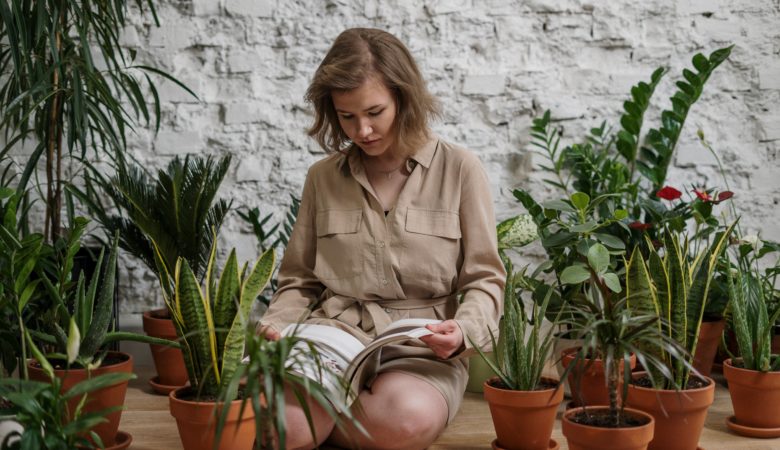Here’s Why Living with and Tending to Plants is Good for Mental Health

Scroll through any Instagram feed and you’re bound to come across plants—whether as a tasteful background or the focus of the photos, nothing screams “I’m a Millennial/GenZer” like owning an indoor jungle. Whether you covet a Monstera (a plant with huge, holey leaves) or just can’t resist succulent-printed shirts with slogans like “life succs,” plants are having a moment. Why?
There’s a certain satisfaction in watching a plant grow from a seed, and no one’s denying that they can function as a beautiful décor element, too. Some of them are great for your indoor air quality, while a vegetable or herb garden ensure you have a summertime supply of fresh produce. If you can’t have pets in your apartment, tending to plants offers the opportunity to care for another living being—and depending on the variety, you can get something as fuzzy or prickly as you like. (Your cat might knock things off the shelves, but your cactus never will.) These are all good reasons to keep plants around—but they don’t explain why plants have become something of a cultural obsession.
It all comes down to mental health. Caring for plants is a time-honored way to keep yourself centered and grounded—and if you can’t keep your own, you can stroll through a park or botanical garden for the same effect.
A history of finding comfort in Mother Earth
For much of human history, gardening has been performed outdoors. It wasn’t until the Victorian era that indoor plants and houseplants became popular. Greenhouses made it possible to bring the outdoors inside. In fact, they made it possible to keep expensive citrus plants alive in England. That was the beginning of owning plants as a status symbol. At one point, a single pineapple cost the equivalent of $8,000 today.
However, status wasn’t the only reason that houseplants were so popular. In Victorian England, houseplants that could survive the “dark, smoky” indoor conditions, like the Kentia palm and the aspidistra, helped brighten up the space. Even poor Victorians bought geraniums to keep on the windowsill.
Whether you tend to an outdoor garden or you’re just trying to keep your single snake plant alive, know that you’re part of a long and storied tradition.
Slow down and smell the soil
How much screen time do you allow yourself? The average American adult spends about 11 hours per day staring at some sort of screen: laptop, smartphone, television, video games and more. The internet has made it possible to get everything we want instantly, from dinner to first dates. With that comes the expectation that we’re always on call and there’s always something else that needs to be done.
Plants are a good reason to slow down and smell the soil, if not flowers. If all you want is some green décor, you can buy fake plants. If you want the full mental health benefits, however, try growing your own. Here are just a few of the perks plants provide:
- Instant mood boost. Studies have shown that being around plants and nature have an instant, positive effect on mood. Watering, fertilizing and trimming back plants also give gardens a sense of quiet satisfaction.
- Improve focus, creativity and mental health. Patients with PTSD have shown significant improvements when engaged in a nature rehabilitation program, and people with ADHD report that they’re better able to focus after caring for plants or walking through nature. Plus, being around nature improves your creativity by 15 percent.
- Lowers stress. Being around and seeing plants lowers stress—so go ahead, use that excuse to get another new green friend.
- Boost your memory. In addition to improving focus, especially in people with ADHD, being around plants can improve your memory retention by 20 percent.
Plus, plants are the quietest living roommates you’ll ever have.
‘Crazy plant people,’ now is your moment
Whether you’re already an avid gardener or you want a new, calming hobby, there’s no better time to become a crazy plant person. With the help of the internet, any novice gardener can look up care instructions or troubleshoot issues. Soon enough, you’ll be propagating succulents, rooting vine cuttings and pruning like a pro. Not only are they beautiful in their own right, their positive effects on your mood (and in some cases, your meal planning) could be the start of a lifelong love affair.

